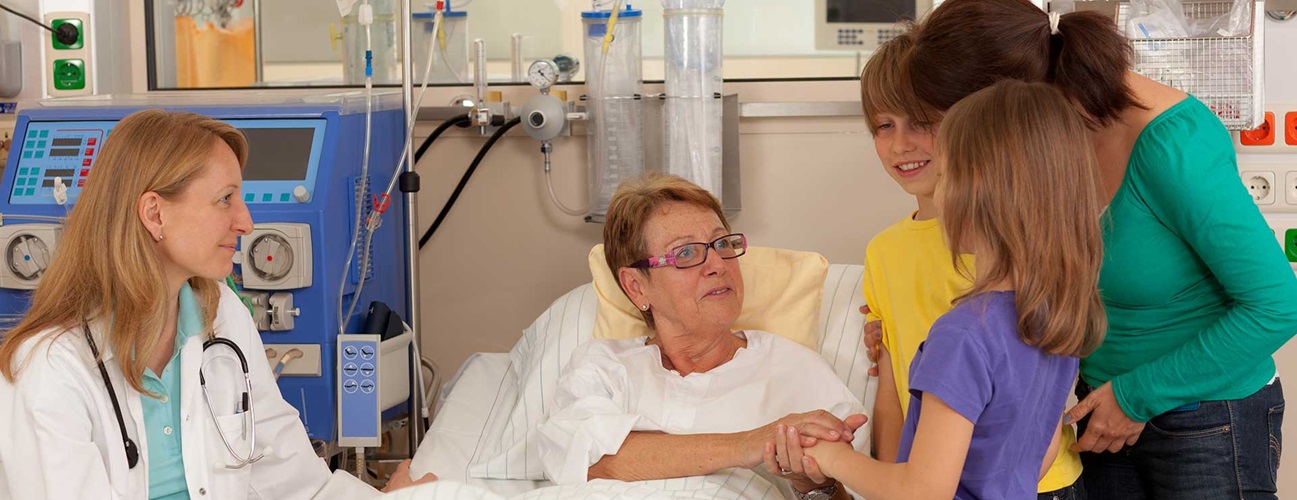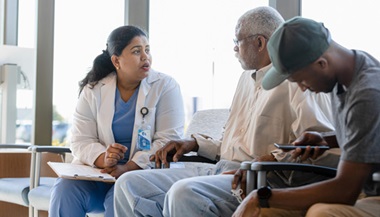Effects of Rehabilitation on the Family
Your family can play a vital role in your rehabilitation process. In fact, one of the most important factors in your recovery is family involvement and support.
What are the possible effects of disability on the family?
Family members are also affected by your disability. In many cases, they may become co-managers of your care. They may undergo many changes as a result of your disability. For example, your family members may also grieve your loss of ability. Severe injury, chronic disease, or disability may mean a change in family roles. For example, a housewife may need to return to work after her husband's disability. A son may need to adjust his work schedule to help care for an elderly parent. These changes can cause stress and conflict in the family. Financial problems due to medical bills or unemployment can occur, adding more stress on the family. Changes in living arrangements, childcare issues, and community re-entry can all pose new problems.
By working together with the rehabilitation team, you and your family can help reduce some of the adverse effects of disability:
Identify how the disability affects the family
Work together on realistic solutions
Participate in family education and counseling
Plan for discharge and community re-entry
Why is family support important?
Family acceptance and support can help you deal with issues related to self-esteem and self-image after disability. Positive attitudes and reinforcement from loved ones often help you work towards recovery. Family participation, flexibility, and open communication can overcome many barriers associated with disability. Families who inspire hope can help you adjust and become more confident in your abilities.
What is the impact of caregiving on the caregiver?
While your family are motivated to take care of you, the emotional and physical toll of caregiving can be overwhelming at times. First of all, consider the amount of caregiving that is expected of families outside the rehabilitation facility. Most caregivers are unpaid family members or friends that provide full- or part-time care, even when you also have a healthcare professional.
As a result, caregivers have unique stress. Caregivers often feel unprepared for their caregiving role. Often they feel isolated, anxious, and depressed. An additional concern is maintaining good communication with the healthcare team and other available resources. This role is time-consuming and can be confusing. The various roles may require a caregiver to:
Investigate and suggest resources to ensure independence in the home
Facilitate and provide physical care for the impaired family member
Contribute financially to the home
Care for other family members
Respond to the ups and downs in rehabilitation care
Ensure that contractors and builders are licensed and ensured
What can be done to assist caregivers?
Caregivers must be educated to meet the demands of your rehabilitation plan. In fact, they should be included in the development of this plan. Specifically, educational topics should include:
The cause and effect of the injury or illness
Any potential complications of the injury or illness, and information on how to recognize and prevent these complications
Medicines, their schedule, side effects, and functions
Required exercises and task-learning techniques
The social and emotional tasks of your rehabilitation
How to reintegrate your into the community after rehabilitation
If this preparation is not provided, caregivers may be overprotective and unwittingly impede your recovery process.
Not only should caregivers be educated for their role, they must also be supported. Whether this is a counseling program or a problem-solving supportive team interaction, support helps diminish the isolation and anxiety associated with caregiving.
Caregivers must also find time for themselves, away from their caregiving roles. This perhaps is the most important, yet least available, coping strategy that may be accessible to caregivers. The importance of caregivers cannot be underestimated in your successful rehabilitation. As caregivers gain confidence, they and their loved ones, should find caregiving less stressful and more rewarding.





